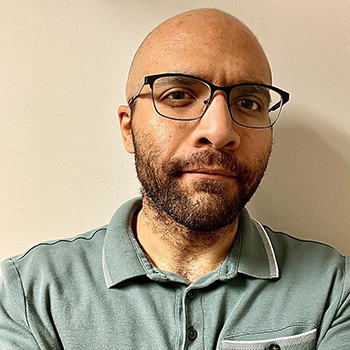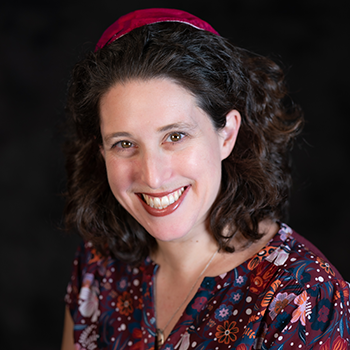When do we read Vayechi
D'var Torah Author
D'Var Torah Author
Chaim Harrison

Chaim Harrison (he/him/his) is a former writer/editor for the Union for Reform Judaism and an alumnus of the 2018 JewV'Nation Fellowship's Jews of Color Leadership Cohort. Chaim is a Professional Certified Marketer® (PCM®) and Certified Digital Marketing Professional (CDMP) with dual certification from the American Marketing Association and Digital Marketing Institute. Chaim lives with his partner and two pets in metro Detroit, where he serves on Temple Beth El's Board of Trustees and is actively involved with his local Jewish Federation. Chaim is also proud to serve as a board member for the Hillel at Miami University, his alma mater.
D'Var Torah Author
Rabbi Dara Lithwick

Rabbi Dara Lithwick (she/her) is passionate about building bridges between people and communities and promoting inclusion as a fundamental Jewish practice. She is an advocate for 2SLGBTQ2I+ inclusion within Jewish spaces and for Jewish inclusion in 2SLGBTQ2I+ spaces.
Rabbi Dara is active in Temple Israel Ottawa where she leads services and teaches. She is also active at Temple Emanu-El Beth Sholom in Montreal, where she teaches introduction to Judaism courses in English and French. Rabbi Dara serves as the chair for the Reform Jewish Community of Canada's Tikkun Olam Steering Committee and is also a member of the Union for Reform Judaism's Commission on Social Action.
In the winter, Rabbi Dara and her partner love shlepping their kids around the National Capital region's ski hills, where Dara serves as a volunteer ski patroller keeping a watchful eye as the kids race downhill skiing.

The book of B’reishit is, in essence, one big, messy story about family. While the relationships discussed in this book are imperfect, they matter because people matter. Imperfect as these families are, they’re still sacred because God exists as the connection between them.
However, as this book’s final portion, Parashat Vayechi, points out, in order for these families to heal and eventually become Am YisraelAm Yisraelעַם יִשְׂרָאֵלLiterally, “the people of Israel.” The nation or people of Israel. The Jewish people. , there first has to be an act of reconciliation.
This theme goes all the way back to Abraham and his immediate family. After Isaac and Ishmael have a messy break, they come back together to bury Sarah. One generation later, Jacob and Esau reconcile after Jacob wrestles with an angel (possibly with himself?), becomes himself (Israel), and is now able to both face his past and look to the future. Parashat B’reishit ends with Parashat Vayechi and, once again, another messy family relationship: Joseph and his brothers.
Once Jacob/Israel dies, his son Joseph has him embalmed in Egypt and gets leave from Pharaoh to bury his father in the cave of the Machpelah, the burial site purchased by Abraham, along with his forebears. Joseph and his brothers and their families then return to Egypt, where they settle. Rightfully so, Joseph's brothers are afraid he may still bear a grudge against them for what they did so many years ago, throwing him into the hole and selling him as a slave.
But something interesting happens in Genesis 50:15-21:
Joseph demonstrates that he has learned the power of peace and forgiveness. He has gained the ability to look back on past events in the light of new insights and experiences, seeing past his own hurt to grasp the bigger picture. He doesn’t deny his own pain, but it no longer controls him. Therefore, he is now able to fully connect with his family whom he still deeply loves, despite the immense pain they caused. As the amazing language in verse 21 says, Joseph is able to “speak straight to their hearts,” without any cover or artifice.
Rabbi Nachman of Breslov writes about this in Likutei Moharan 34:8:
The nekudah, or “point,” is that spark of God that we all have within us, no matter our differences. As Reb Nachman explains, Joseph is able to shine his nekudah – his God-spark – to those of his brothers, reconciling their differences in the process. As part of this big, messy family, we as the Jewish people must do our best to emulate Joseph if we have any desire to connect across difference. It can be very hard to access our own internal God-sparks, let alone others’, but we must try, for that is how we can ultimately be reconciled and redeemed.
As noted by Lord Rabbi Jonathan Sacks (z”l):
B’reishit ends by giving us some of the key tools to engage in tikkun olam,tikkun olamתִּקּוּן עוֹלָם"Repair of the world;" Jewish concept that it is our responsibility to partner with God to improve the world. A mystical concept of restoration of God's holiest Name to itself and the repair of a shattered world. Often refers to social action and social justice. to create a place where we can all live. May we use these tools, the God-sparks within us, to engage in the work of connection and reconciliation that our world so desperately needs right now and bring about transformation and redemption.